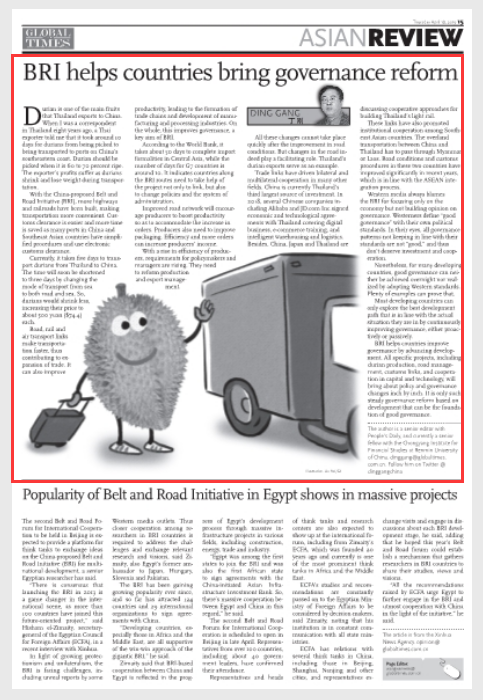Belt and Road
Your Present Location: PROGRAMS> Belt and RoadDing Gang: BRI helps countries bring governance reform
By Ding Gang Source: Global Times Published: 2019-4-17
Durian is one of the main fruits that Thailand exports to China. When I was a correspondent in Thailand eight years ago, a Thai exporter told me that it took around 10 days for durians from being picked to being transported to ports on China's southeastern coast. Durian should be picked when it is 60 to 70 percent ripe. The exporter's profits suffer as durians shrink and lose weight during transportation.

With the China-proposed Belt and Road Initiative (BRI), more highways and railroads have been built, making transportation more convenient. Customs clearance is easier and more time is saved as many ports in China and Southeast Asian countries have simplified procedures and use electronic customs clearance.
Currently, it takes five days to transport durians from Thailand to China. The time will soon be shortened to three days by changing the mode of transport from sea to both road and sea. So, durians would shrink less, increasing their price to about 500 yuan ($74.4) each.
Road, rail and air transport links make transportation faster, thus contributing to expansion of trade. It can also improve productivity, leading to the formation of trade chains and development of manufacturing and processing industries. On the whole, this improves governance, a key aim of BRI.
According to the World Bank, it takes about 50 days to complete import formalities in Central Asia, while the number of days for G7 countries is around 10. It indicates countries along the BRI routes need to take help of the project not only to link, but also to change policies and the system of administration.
Improved road network will encourage producers to boost productivity so as to accommodate the increase in orders. Producers also need to improve packaging. Efficiency and more orders can increase producers' income.
With a rise in efficiency of producers, requirements for policymakers and managers are rising. They need to reform production and export management.
All these changes cannot take place quickly after the improvement in road conditions. But changes in the road indeed play a facilitating role. Thailand's durian exports serve as an example.
Trade links have driven bilateral and multilateral cooperation in many other fields. China is currently Thailand's third largest source of investment. In 2018, several Chinese companies including Alibaba and JD.com Inc signed economic and technological agreements with Thailand covering digital business, e-commerce training, and intelligent warehousing and logistics. Besides, China, Japan and Thailand are discussing cooperative approaches for building Thailand's light rail.
These links have also promoted institutional cooperation among Southeast Asian countries. The overland transportation between China and Thailand has to pass through Myanmar or Laos. Road conditions and customs procedures in these two countries have improved significantly in recent years, which is in line with the ASEAN integration process.
Western media always blames the BRI for focusing only on the economy but not building opinion on governance. Westerners define "good governance" with their own political standards. In their eyes, all governance patterns not keeping in line with their standards are not "good," and thus don't deserve investment and cooperation.
Nonetheless, for many developing countries, good governance can neither be achieved overnight nor realized by adopting Western standards. Plenty of examples can prove that.
Most developing countries can only explore the best development path that is in line with the actual situation they are in by continuously improving governance, either proactively or passively.
BRI helps countries improve governance by advancing development. All specific projects, including durian production, road management, customs links, and cooperation in capital and technology, will bring about policy and governance changes inch by inch. It is only such steady governance reform based on development that can be the foundation of good governance.
The author is a senior editor with People's Daily, and currently a senior fellow with the Chongyang Institute for Financial Studies at Renmin University of China.























































































 京公网安备 11010802037854号
京公网安备 11010802037854号





